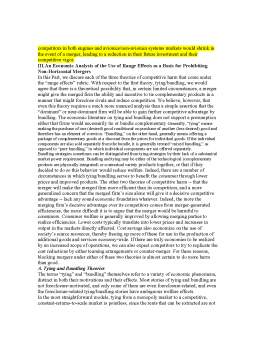Extras din proiect
1. Consiliul European s-a axat in principal pe efectele pe care aceasta fuziune le-ar fi avut supra concurentei, nu direct asupra consumatorului. La inceput, Consiliul European sustinea ca nu este incantat de faptul ca productia si comercializarea motoarelor de avion ale General Electric vor forma un pachet commercial cu produsele Honeywell pentru avioane, lucru c ear fi afectat in mod sigur firmele competitoare. Dupa ce General Electric a adus argumente ce respingeau aceasta posibila asimilare a pietei, Comisia Europeana a reformulat principalul motiv al opozitiei sale in ceea ce privea aceasta fuziune: divizia de leasing a General Electric (GE Capital Aviation Services, GECAS) ar putea pune in difcultate firmele competitoare prin ofertele sale.
The U.S. response would be that's especially not true in high tech, where innovation can be explosive. Today's monopolist is tomorrow's has been."
Lessons from the GE-Honeywell Non-Merger
It looked as if it would be a marriage made in heaven when General Electric announced plans last year to acquire Honeywell International. But after a protracted and rocky engagement, these star-crossed corporations will not be walking down the aisle.
Both companies were blissful when the antitrust division of the U.S. Justice Department gave its blessing to what would have been the largest industrial acquisition ever. When the bride and groom sought approval from the European Union, however, the EU’s competition commissioner, Mario Monti, vetoed the betrothal. At the last minute, GE made concessions to the EU and the 20-member European Commission, the EU’s executive arm -- and Honeywell made concessions of its own to GE -- but the overtures were not enough to salvage the relationship.
It is natural to look for someone to blame when a high-profile transaction goes awry, especially a $42-billion deal involving major players in an important sector like aerospace. But faculty members at Wharton and the Goizueta Business School of Emory University say there is no one person, government agency or company to whom an accusing finger can be pointed. There are, though, plenty of lessons to be learned by everyone involved in the case, including regulators who do not see eye to eye on antitrust theory, and by other multinational corporations thinking of tying the knot in the future. It is also clear that Honeywell, at least in the short term, will suffer more from the failed deal than GE.
"My sense is one of the reasons why this has gone so badly wrong is that the parties didn’t do their homework," says Wharton’s Edward T. Swaine, a professor of legal studies who conducts research on international antitrust law. "I think it’s odd if GE and Honeywell were surprised by the road the EC took. I don’t agree with the EC on the substance of its decision, but I can’t say I was terribly surprised."
It was stunning news when GE, based in Fairfield, Conn., announced last October that it had reached an agreement to acquire Honeywell. Jack Welch, GE’s hard-nosed and much-admired CEO, has such star power that people at the time focused as much on his decision to postpone his retirement to oversee the merger as on the merits of the combination itself. Some people thought Welch had such an ego that he used the acquisition as an excuse to remain in a job he could not bring himself to relinquish. In retrospect, that kind of speculation seems to have been off the mark, but personalities in business and government have played roles in the GE-Honeywell saga.
When the EC announced opposition to the merger this spring, some wondered how a group of European bureaucrats could possess the authority to thwart a transaction involving two American companies and why the firms involved would have virtually no recourse for an appeal. Another pertinent question was this: Why does the EC focus on the effects that a proposed merger would have on the competition, while U.S. antitrust officials concentrate on the effects it would have on consumers?
Actually, little is new about the EC exercising oversight over U.S. firms. European antitrust regulators have taken an active interest in other acquisitions involving U.S. companies in the past, and American officials have done the same with regard to proposed consolidations involving European businesses. Nonetheless, there was talk that Monti was primarily acting not on the merits of the case but at the urging of GE’s European competitors, who were less than eager to see the merger approved.
Inevitably, the case attracted the attention of politicians. President Bush and two U.S. senators expressed concern about the EC’s opposition to the merger. In response, Monti bristled at any suggestion that he was acting inappropriately.
"Based on what I know, I think the EC’s decision was substantively incorrect," Swaine observes. "But I am dubious of suggestions that there was something particularly untoward about the process: that the EC was listening to GE’s competitors too much, that there was anti-Americanism, and that the EC was developing a new antitrust theory [for application in this case]. I think all of those claims are incorrect. This is a theory the EC has used before and I don’t think this is a result of bias against American companies. European companies themselves have said they can’t believe how rigid Monti is" in applying antitrust rules consistently in all cases.
However, Rajendra K. Srivastava, a marketing professor at Emory University’s Goizueta Business School and the University of Texas at Austin, says Monti did not help his case by offering different reasons at different times for his opposition to the merger. The multiple explanations, Srivastava says, gave the appearance that EC officials were making up antitrust rules as they went along.
Preview document
Conținut arhivă zip
- Stiudiu de Caz - General Electric Honeywell.doc















